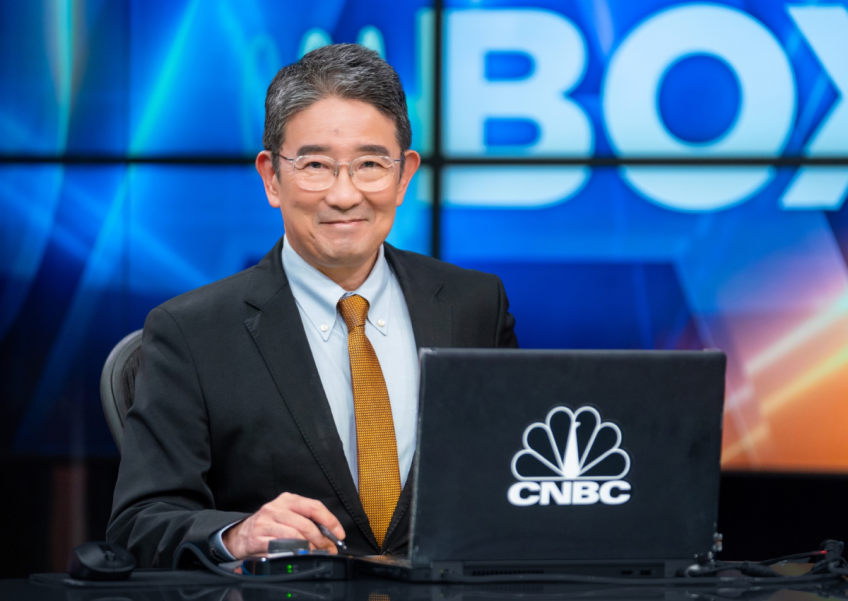I could be replaced by a hologram in 6 months, jokes veteran news anchor Martin Soong who's still optimistic about technology in media


 PUBLISHED ONMarch 08, 2024 3:06 AMByDrima Chakraborty
PUBLISHED ONMarch 08, 2024 3:06 AMByDrima ChakrabortyFor anyone who's watched CNBC's Squawk Box Asia or Street Signs Asia in the mornings, veteran broadcast journalist Martin Soong is sure to be a familiar face.
The 65-year-old has been with the network for nearly 31 years and in the industry for over 40. But with his father also being a journalist, Martin initially didn't want to go into the field.
The Singapore-based news anchor told AsiaOne in a recent interview: "You know how it is with a lot of people whose fathers are either famous or have achieved a lot.
"Their kids often are reluctant to do the same thing, because they're worried that they're going to end up sort of living in the shadow of their father or mother for much of the time, so I actually consciously didn't really try to follow in his footsteps for a while."
However, while studying in university, Martin started "dabbling" in radio and wire services and realised that journalism was something he could do on his "own steam".
After trying everything from radio, wires, to magazines and dailies, Martin eventually took up a TV role and has been a news anchor since, interviewing key political and business figures and earning seven wins at the Asian Television Awards along the way.
Martin shared some of the highlights of his career with us, including covering the 9/11 attacks overnight in Singapore in 2001.
"I think I spent 15 hours in the chair nonstop until someone else took over. It was crazy, just watching things unfold and develop, and the planes hitting the towers," he shared. "It was frightening and exhausting, but it's probably one of the most important stories of our times."
He's also reported from around the world — even in places so cold or hot that his iPhone shuts down — and likes "being let off the leash occasionally" instead of constantly reporting from the desk.
[[nid:641489]]
"It's much more real, I guess, being on location, in a country, talking to real people, visiting real places, going to stores or talking to protesters," he said. "News-gathering these days can easily be sitting wherever you are with a connection and doing it through your phone or whatever device you're using.
"But nothing really beats being there and talking to warm bodies."
He added: "News-gathering can be a lot more efficient and a lot faster these days because of technology, right? But what you're actually gathering is not so much news, you're gathering views I think."
Nevertheless, he considers social media platforms like X (formerly known as Twitter) "a good place to start" the process.
Though he joked that he could be "replaced by a hologram in six months or maybe sooner", Martin thinks wireless technology is a boon overall because it is "democratised".
"Technology has advanced to the stage where we can broadcast live from literally anywhere, wherever there's a connection," he said. "I remember several years ago, I had a colleague in Hong Kong doing that, and she was broadcasting on her iPhone, from her balcony in the middle of a hurricane."
Martin also thinks citizen journalism is "a pretty cool thing" and will end up being complementary to mainstream news outlets.
"I mean, obviously, I watch our own network, I watch the competition. I also watch citizen journalists, on whatever media platform. And it gives me more information, more options," he said.
Fit, and still fiery at 75, #Malaysian opposition leader @anwaribrahim ahead of snap elections tomorrow - "A General does not talk about defeat, ahead of a battle". CNBC shooter @Kwaiclye in-between us. #MalaysiaVotes #MalaysiaGE15 #CNBC pic.twitter.com/NXZlCVSIUq
— Martin Soong (@MartinSoong) November 18, 2022
Martin recalled a time several years ago when he visited a university with a journalism programme and learnt that their students were 90 per cent women.
When he asked why, he was told that "the guys want to do serious stuff like engineering", which Martin found to be a pity.
"Then I asked them, 'What happens to your kids when they graduate?' They go, 'Most of them go into public relations (PR) simply because PR pays better'," he shared.
Though Martin agrees that "money matters" and people may have to make pragmatic decisions about their career paths, he finds it a waste to spend "four years of your life and untold hours" studying journalism and not actually make use of it.
So the advice he has for young journalists or those looking to go into the field is to ask themselves: "Why am I doing this?"
"Because if you're doing it for pragmatic reasons, that's fine, no judgement, you gotta pay the rent," he said. "But in the longer term, is that the only reason you're doing it? Maybe that's not a sustainable reason.
"I think you have to really enjoy it and really like what you're doing. You need to just be innately curious about the world."
[[nid:674055]]
drimac@asiaone.com
No part of this article can be reproduced without permission from AsiaOne.